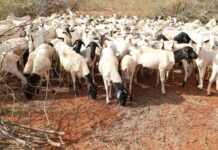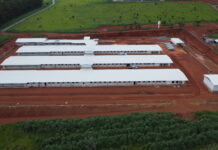The Africa Fertilizer and Soil Health Summit (AFSH) is currently underway to offer a comprehensive review of the state of soil health on the continent and the use of fertilizers. The Summit, an initiative of the African Union, is being held in Nairobi, Kenya from the 7th -9th May 2024, under the theme “Listen to the Land”. It seeks to review the progress made since previous commitments by African leaders to boost fertilizer use for agricultural growth in Africa. Over 40 countries are below the target 50 kg (nutrients) per hectare, set at the first AFSH held in Abuja in 2006, with most averaging at 18 kilograms per hectare.
The discussions by various stakeholders have emphasised the urgency of paying attention to the needs of the land in terms of soil nutrients, soil moisture, essential minerals, soil organisms, impact of climate change; and adopting regenerative practices, policies and approaches that will improve the long-term value of land as a critical asset for farmers. The stakeholders evaluated the existing policies, programs and institutional structures for effective soil management system to improve and maintain soil fertility on the continent.
The summit is convened at a time millions of Africans across the continent are facing severe food and nutrition deficiencies, thus providing an opportunity for policy makers, scientists, farmers, the private-sector, development agencies, civil society organizations, non-governmental organizations, and scholars to reflect on long-term and sustainable strategies of innovative avenues to feed the growing African population.
The summit refers to previous key declarations and commitments by Heads of State and Government to drive agricultural productivity to improve food and nutrition security such as:
- The Maputo Declaration on Agriculture and Food Security in Africa adopted in 2003, where member states committed to allocate at least 10% of national budgets to agriculture and rural development policy implementation by 2008.
- The Abuja Declaration adopted in 2006, which underscored the importance of increased fertilizer use to stimulate agricultural productivity growth to end hunger and poverty in Africa to realize the African Green Revolution.
- The Malabo Declaration adopted in 2014 where African leaders declared their commitment to end hunger in Africa by 2025.
- The declaration on Accelerated Agricultural Growth and Transformation for Shared Prosperity and Improved Livelihoods, which focused on doubling agricultural production levels by 2025.
- The Soil Initiative for Africa in September 2020, where the African Union issued a call for a long-term effort to systematically improve the health and productivity of Africa’s soils by scaling proven and locally adapted technologies, including balanced and efficient (inorganic and organic) fertilizer application.
Speaking at the opening of the joint ministerial meeting of ministers of agriculture and those of foreign affairs at the summit, H.E. Dr. Mohamed Salem Ould Merzoug, Minister of Foreign Affairs, Cooperation and Mauritanians Abroad, of Mauritania, and Chairperson of the African Union Executive Council stressed that agriculture is the cornerstone of Africa’s future and sovereignty in the face of pervasive globalization, and called for synergy of mechanization, supply chain, environmental stewardship, and human resource excellence. He stated “Our continent’s wealth of transboundary waterways—59 river and sea basins—is a wellspring of potential for agricultural expansion and a conduit for our collective progress. Yet, we must confront the stark reality that malnutrition afflicts 20% of our population, with the population poised to reach two billion by 2040. Dependence on external food sources not only undermines a nation’s autonomy but also imperils its security and stability. Confronted with these challenges, it is incumbent upon us to judiciously harness our agricultural and aquatic resources. […] The lessons of the COVID pandemic and the Russia-Ukraine crisis underscore the immediacy of our continental imperative.”
H.E. Dr. Monique Nsanzabaganwa, Deputy Chairperson of the African Union Commission observed that the impact of COVID-19 coupled with the conflict in Ukraine, the multiple conflicts on the continent, and climate change, have affected the agricultural production and economic growth of African countries. She stated, “in 2006, African Heads of State and Government endorsed the Abuja declaration on Fertilizers for a Green Revolution in Africa, with a target of 50 kilograms per hectare per annum. To-date, our continent is still far from achieving this target with an average fertilizer use rate standing at about 18 kilograms. To bridge the productivity gap with the rest of the world, Africa needs to take bold measures. This can only be done by agreeing
on common measures, informed by lessons from others from within and outside the continent, on best practices. […] During the Summit, we will learn from specialists and practitioners about good practices, combined with the adequate technologies to
manage our soils, while ensuring that we do not destroy our environment. We will hear about actions which we need to take collectively to ensure that we close the gap in our best practices with the rest of the world to maintain our competitiveness while we cater to the millions of Africans whose lives and livelihoods depend on agriculture and food systems.”
H.E. Dr. Musalia Mudavadi, Kenya’s Prime Cabinet Secretary and Cabinet Secretary for Foreign and Diaspora Affairs observed that Africa will not achieve its aspiration on eliminating hunger and poverty without a sustainable approach to soil health, prudent use of agricultural inputs, environmental conservation and embracing of technologies that can make production systems efficient and effective. “Though fertilizers are estimated to contribute more than 30% of the crop yield, we have witnessed in our country that fertilizer alone cannot sustain increased agricultural productivity and production. For example, observations have been made that maize yields have stagnated despite increased fertilizer use. This has resulted in input bundling, emphasis on balanced nutrition, soil sampling and testing. In recognition of the need for integrated soil management, the Government in collaboration with other stakeholders has developed the National Soil Management Policy. This policy contains critical directions on sustainable agricultural soil and water management, the environment, technology development, its dissemination and utilization, fertilizer development and investments.”
Hon. Frank Tumwebaze, Uganda’s Minister of Agriculture, Animal Industry and Fisheries, and Chair of the AU Specialized Technical Committee on Agriculture, Rural Development, Water and Environment, while referencing the theme of the Africa Fertilizer and Soil Health Summit #ListenToTheLand, underscored the urgency to pay attention to soils, to understand them and what they need, and to manage them better for current and future generations. “We have to rehabilitate our soils and make them more productive. As farming countries of Africa, we will discuss common approaches to handling the issue of our soil health. Every African country is seeking to achieve food security for its people, animal feed security, and nutrition and environmental security. The question is – how do we balance our food, our feed, our environment and at the same time produce nutritious food? To achieve that balance, we have to pay attention to our soil health, it is the starting point for all other interventions. We must reverse the current trend of fertility loss estimated at 80kg of nutrients per hectare per year, and equally work on strategies to minimize topsoil erosion exacerbated by climate change.”
Hon. Mithika Linturi, Kenya’s Cabinet Secretary of the Ministry of Agriculture and Livestock Development observed that soil fertility depletion is a fundamental root cause of declining per capita production arising from continuous mining of soil nutrients, inappropriate farming practices including use of blanket fertilizer recommendations which have led to a decline in crop productivity, food insecurity, and low return to agricultural investment and environmental degradation. “Only 18% of Kenya’s land area is arable for crop production. Moreover, the area under cereals production alone measures some 2.7 million hectares, or 47% of the total arable land. This puts pressure on the soils in these agricultural areas to produce enough food for both local consumption and export purposes, and calls for action not only to utilize these areas, but also do it in a sustainable manner.”
H.E. Amb. Josefa Sacko, AU Commissioner for Agriculture, Rural Development, Blue Economy and Sustainable Environment, noted that despite multiple efforts, Africa falls short of the Abuja Declaration targets on fertilizer consumption which has only risen from 8kg/ha to below 25 kg/ha since 2006, far below the 50kg/ha target. 22 African countries recorded fertilizer consumption of less than 10 kilograms per hectare. The Commissioner however listed 10 countries that have met or surpassed the 2006 Abuja declaration of 50kg/ha target as follows: Morocco (55.29); Eswatini (57.77); Botswana (59.27); Kenya (60.66); Zambia (63.90); Malawi (96.74); South Africa (104.64); Mauritius (186.50); Seychelles (542.47); Egypt (542.57).
The joint ministerial session of ministers of agriculture and foreign affairs held on 8th May 2024, which was preceded by an experts’ session on 7th May 2024, reviewed the Africa Fertilizer and Soil Health Summit ‘Nairobi Declaration’ which will be adopted by Heads of State and Government on 9th May 2024. Other outcomes of the summit will include the a 10-year Fertilizer Action Plan; a Soil Initiative for Africa document; and a Mechanism to finance the Action Plan. The ratification of the African Initiative on Soil Health and the ten-year plan for fertilizers and soil health will mark a pivotal stride towards a green revolution across Africa, laying the groundwork for an agricultural renaissance.
For details of the AFSH, visit Africa Fertilizer and Soil Health (AFSH) Summit 2024 | African Union (au.int). To share your thoughts, opinions and comments, use the hashtags #ListenToTheLand ,#SoilHealth ,#AFSH24, #Agenda2063.








